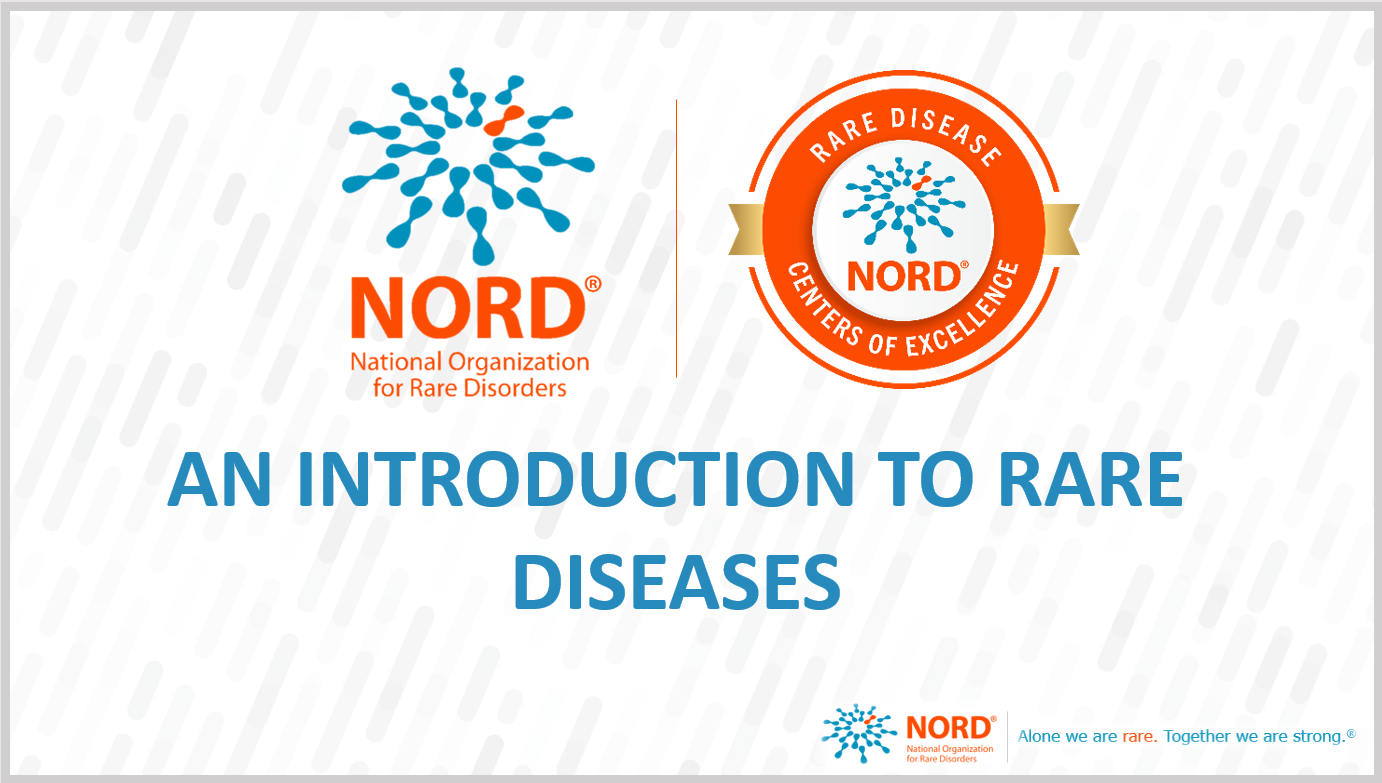An Introduction to Rare Diseases

About Course
The National Organization of Rare Diseases (NORD) has launched a FREE Rare Disease Education course for students. Health care professionals and researchers across the 40 NORD Rare Disease Centers of Excellence have come together to curate a group of 20, 30-60 minute lectures covering an Introduction to Rare Diseases, Disease Examples, Social and Ethical Implications of Working in Rare Diseases, and Careers in Rare Disease. The course will be available all year long. Upon completion of the approximately 20-hour course, students will receive a Certificate of Completion from the NORD Rare Disease Centers of Excellence.
A rare disease is a condition that affects fewer than 200,000 Americans. Cumulatively, there are more than 10,000 rare diseases affecting more than 30 million Americans. Many experience a prolonged diagnostic odyssey, meaning that it can take years for them to be diagnosed with a rare condition, which can be detrimental to their health and wellbeing. With increased provider education and awareness about rare conditions, more patients can be diagnosed and cared for sooner.
Upon completing this course, you will:
- learn about the health care gap for 1 in 10 Americans
- have a better understanding of rare diseases
- learn about the importance of becoming a rare disease patient advocate
- understand that patients and their families NEED you to know about rare diseases
Course Content
Welcome!
-
Welcome!
-
Pre-Course Test
Rare Diseases Overview
Rare Disease Examples
Social, Ethical, and Political Implications of Living with a Rare Disease
Careers in Rare
Course Completion
Course Resources
- NORD Rare Disease Student Resources
- Spotlighting the Zebras: A Role for Medical Students in Shaping Rare Disease Care
- Get Involved: NORD Students for Rare Chapters and Clubs
- Quarterly NORD Student Newsletter (sign up)
- Learning Genetics - Exome Sequencing and Secondary Findings
- Karyotyper: An Introduction to Learning Chromosomes
- Unique: Understanding Rare Chromosome and Gene Disorders
- Genetics in Wisconsin: Resources for Professionals
- Baylor College of Medicine: Evening with Genetics
- Additional Student Lectures (from 2023)
Course Resources
- Rare Disease Facts and Statistics
- ASHG: Success Stories in Human Genetics and Genomics Research
- NCATS Rare Diseases Are Not Rare! 2020 Challenge
- NORD: Rare Disease Patient Stories
- Rare Disease Day: Meet Our Heroes!
- The Orphan Drug Act Turns 40!
Course Resources
- Elements of Morphology: Introduction
- Elements of Morphology: Ear
- Elements of Morphology: Hands and Feet
- Elements of Morphology: Head and Face
- Elements of Morphology: Oral Region
- Elements of Morphology: Nose and Philtrum
- Elements of Morphology: Periorbital
Course Resources
- Telehealth and Telegenetics Resources
- National Consortium of Telehealth Resource Centers
- Children's National Telemedicine Pilot Program
- Government Patient and Provider Telehealth Resources
- American Medical Association's Helpful Resources for Telehealth
- American Academy of Pediatrics Provider Resources for Telehealth
- Family Voices Telehealth Checklist
- Got Transition
- The Transition to Adulthood for Youth Living with Rare Diseases
- Course: Optimizing Transition from Pedicatric to Adult Care
- Planning for a Successful Transition from Pediatric to Adult Care
- Integrated Care: Care Mapping
- National Academies - Improving Diversity of the Genomics Workforce: Proceedings of a Workshop in Brief
- Diversity in Cancer Genomics Research is a Matter of Equity and Scientific Discovery
- Cultivating Diversity as an Ethos with an Anti-Racism Approach in the Scientific Enterprise
Course Resources
- Resources for Early Stage Investigators
- Undiagnosed Disease Network
- NIH - Patient Registries
- The Jackson Laboratories (Home)
- The Natural History of Neurcognition in MPS Disorders: A Review
- Mucopolysaccharidoses Rare Disease Report
- National MPS Society
- What are the goals for Patient Education?
- CDC Clear Communication Index
- Culturally and Linguistically Appropriate Services
- Center for Medicaid Servies (CMS) Written Materials Toolkit
- The Patient Education Materials Assessment Tool
- Health Literacy Online Checklist
- Health Literacy Insights for Health Crisis
- Creating Culturally Responsive Resources and Translations
- Promoting Equitable Access to Language Services for Families of CYSHCN (PEALS)
- Plain Language Checklist
- Readability Scoring System
- Bonus Lecture: Williams Syndrome
- NORD Rare Disease Report: Williams Syndrome
- Williams Syndrome Clinic at Montefiore
